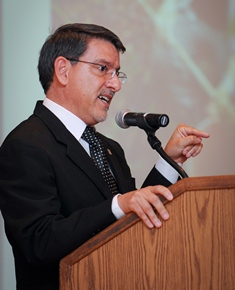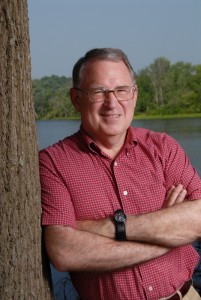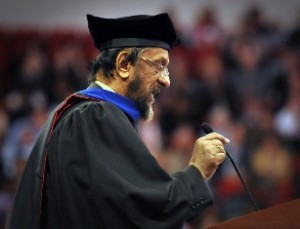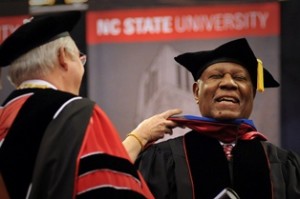
Dr. Julio César Calvo Alvarado, the 6th Norman E. Borlaug Distinguished Lecturer on Global Service to Society and the Environment - 10/31/2011 NC State University
The sixth Borlaug lecturer – Dr. Julio Cesar Calvo Alvardo – has an important connection to N.C. State University: He earned his doctorate in forestry here in 1991 and went on to become president of one of Costa Rica’s most prestigious universities, said Dr. Dan Robison, associate dean of the College of Natural Resources (CNR).
In introducing Calvo at the October lecture, Robison said he had hoped that Calvo’s doctoral mentor Dr. Jim Gregory of the College of Natural Resources could be on hand to introduce the speaker, but Gregory was away from campus. Still, Robison reflected on the honor of having one’s own student to become president of the Technological Institute of Costa Rica, or TEC for short.
“How many of us here can say that one of our former students has become a university president?” Robison said. “And not just any university – TEC was established in 1971 and is one of the most prestigious universities in all of Central America.
“TEC is autonomous, public and comprehensive and offers bachelors through doctoral degrees. An institution of about 8,000 students, TEC has a mission and determination similar to ours here at N.C. State,” Robison said.
The Nobel Laureate Dr. Norman E. Borlaug Distinguished Lecture on Global Service to Society and the Environment is held in October each year in conjunction with World Food Day and in recognition Borlaug’s accomplishments in revolutionizing food production and speaking out on environmental management. The late Dr. Norman Borlaug – known as father of the Green Revolution — was the lecture’s inaugural speaker in 2005.
Sponsored by both the College of Agriculture and Life Sciences and the College of Natural Resources, the lecture has brought to campus a number of professionals who have worked for sustainability of both humankind, through food production, and the environment.
Calvo’s lecture focused on “Costa Rica in the Path of Environmental Sustainability. Lessons Learned.” He described how Costa Rica has become a leader in Central America in striving for environmental, economic and social sustainability.
Costa Rica is one of only a few countries that have reversed the process of deforestation, thanks to a concerted government effort that started in the 1970s, Calvo said. While 59 percent of Costa Rica was forested in 1969, a national development plan based on agriculture and livestock led to major deforestation that reduced forest cover to an all-time low of 40 percent by 1986. An intensive effort has restored forest cover to 50 percent of the country in 2010, and today Costa Rica is working hard to maintain a sustainable balance.
Much of the country – 25 percent – has been protected as national park land, and forest plantations have helped to renew the country’s forest resources. As a result, tourism in Costa Rica has grown to more than 2 million visitors each year.
Costa Rica also has made a substantial investment in human and infrastructure development. The country’s strong education system has resulted in a higher standard of living and low childhood malnutrition rates.
Pursuing a high standard of living and sustainable development has required Costa Rica to carefully manage its energy usage, Calvo explained. The country has developed a strong hydroelectric energy system and also is investing in other options for renewable power sources. As a result, Costa Rica has been able to manage its carbon footprint, Calvo said.
The country also has invested in roads, helping to provide useful infrastructure for trade. Costa Rica exports more than 4,000 products around the world. Its gross domestic product is growing, and it is considered one of the best countries in the region for foreign investment.
Costa Rica is faring better than many of its neighbors, Calvo said. Investment in education and strong democracy gives Costa Rica a better chance of achieving sustainability. But this model won’t work in all countries, Calvo said.
Costa Rica is a good case study. Its path towards sustainability is built on quality education, health and a stable society as precursors to sustainable environmental management, while in many developing countries those precursors are not in place, and the approach must be different — and probably more challenging, he said.
At the conclusion of the lecture, Dr. Paul Mueller, crop science professor, gave Calvo a piece of North Carolina’s own Seagrove pottery, a gift that has become a Borlaug lecture tradition.

During his visit, Calvo also delivered a couple short seminars and engaged in small group roundtable discussions with faculty, staff and students from the two sponsor colleges.
– N. Hampton, CALS Communications
 Dr. Robert (Bob) Brown, Dean of the College of Natural Resources at North Carolina State University, has announced his plans to retire in late summer-early fall, 2012.
Dr. Robert (Bob) Brown, Dean of the College of Natural Resources at North Carolina State University, has announced his plans to retire in late summer-early fall, 2012.





